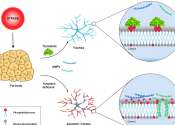Simulation of infant gut makes predictions about optimal milk formula
Doctoral candidate David Versluis successfully simulated an infant gut. This is crucial for research on improvements in formula milk. Currently, such research primarily relies on diaper contents, which is not optimal. Versluis ...
Apr 25, 2024
0
0









